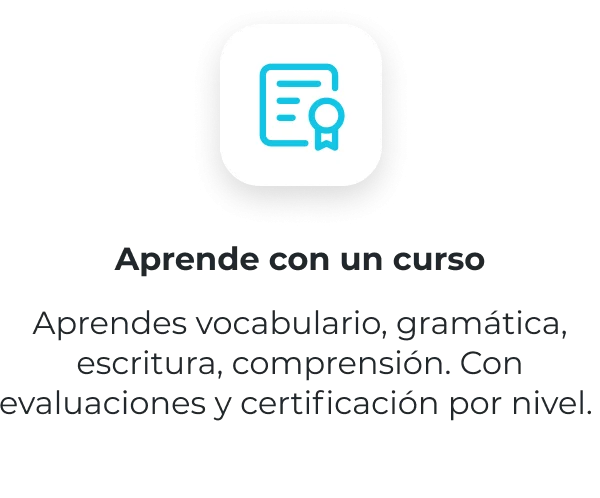Condicionales en inglés
¿Qué son los condicionales en inglés y cuándo se usan?
Los condicionales son muy utilizados en inglés, aunque podría parecer que no son comunes en nuestra comunicación diaria. Básicamente un condicional es una estructura gramatical que nos permite expresar algo que sucede basado en que se cumpla o no una condición.
¿Cuántos condicionales hay en inglés? Existen cuatro tipos de condicionales en inglés y cada uno de ellos aborda algo que podría suceder (en el presente o futuro) o que podría haber ocurrido (en el pasado). ¿Alguna vez te has arrepentido de algo? En ese caso, seguramente has utilizado un condicional para expresar tu arrepentimiento. Mira estos ejemplos:
Ejemplos:
- If I had not lost my wallet, I would have all my documents. (Si no hubiera perdido mi billetera, tendría todos mis documentos.)
- If they had attended the course, they would have learnt how to paint. (Si hubieran asistido al curso, hubieran aprendido a pintar.)
Tipos de condicional
Zero Conditional
El zero conditional se utiliza para hablar sobre verdades generales o situaciones que son reales y posibles.
Para construirlo, se usa la estructura siguiente:
If + sujeto + verbo en presente simple, sujeto + verbo en present simple
Como lo puedes ver, los verbos de ambas cláusulas van en presente simple.
Ejemplos:
- If you fall, you get hurt. (Si te caes, te lastimas.)
- If you walk under the rain, you get wet. (Si caminas bajo la lluvia, te mojas.)
First Conditional
El first conditional se usa para hablar de una condición posible y un resultado probable en el futuro.
Para construirlo, se usa la estructura siguiente:
If + sujeto + verbo en presente simple, sujeto + will/won’t + verbo en infinitivo
En este caso, el verbo de la cláusula de condición va en presente simple, mientras el de la cláusula de respuesta va en futuro con will.
Ejemplos:
- If they pay me for the project, I will buy a new car. (Si me pagan para el proyecto, compraré un carro nuevo.)
- If they get some days off, they will visit us. (Si tienen unos días libres vendrán a visitarnos.)
Second Conditional
El second conditional se utiliza cuando hay pocas probabilidades de que suceda algo.
Para construirlo, se usa la estructura siguiente:
If + sujeto + verbo en past simple, sujeto + would/wouldn’t + verbo en infinitivo
En este caso, el verbo de la cláusula de condición va en pasado simple, mientras la cláusula de respuesta va con el verbo modal would seguido del verbo en infinitivo.
Ejemplos:
- If he were more organized, he would give better outcomes. (Si fuera más organizado daría mejores resultados.)
- If they were rich, they would travel the world. (Si fueran ricos, viajarían por todo el mundo).
Third Conditional
El third conditional se usa para hablar sobre el pasado en situaciones de arrepentimiento.
Para construirlo, se usa la estructura siguiente:
If + sujeto + verbo en pasado perfecto, sujeto + would/wouldn’t have + participio pasado del verbo
En este caso, el verbo de la cláusula de condición va en pasado perfecto, mientras la cláusula de respuesta va con el modal would/wouldn’t have seguido del participio pasado del verbo.
Ejemplos:
- If you had listened to me, you would have saved your tears. (Si me hubieras escuchado, te hubieras ahorrado las lágrimas.)
- She would have played better if she had trained every day. (Hubiera jugado mejor si hubiera entrenado todos los días.)
Expresiones Condicionales con Unless, As long as, Provided, In case, Even if
Estas conjunciones se utilizan con los verbos modales “will”, “would” y “could”. Éstas conjunciones están relacionadas a posibilidades y condiciones:
- He won’t go unless she goes with him. (Él no irá a menos que ella vaya con él.)
- We would offer a discount as long as they accepted the delivery dates. (Ofreceríamos un descuento siempre que acepten las fechas de entrega.)
- We could change the design provided they paid the extra cost. (Podríamos cambiar el diseño siempre que ellos paguen el coste extra.)
- I would take an umbrella in case it rained. (Yo me llevaría un paraguas, por si lloviera.)
- He wouldn’t stop working even if he retired. (Él no dejaría de trabajar aunque lo jubilaran.)
+30 MILLONES DE ESTUDIANTES
Únete a la academia digital de inglés
más grande del mundo y aprende inglés
Ejercicios de los condicionales en inglés
Ejercicios del zero conditional
Ejercicio del zero conditional en afirmativa
Completa las siguientes oraciones afirmativas en zero conditional.
1. If Tony _______________ (wake up) at 7 a.m., he ________ (be) grumpy.
2. If I ______________ (go) late to bed, I _________ (feel) terrible the next day.
3. Anna ___________ (miss) her friend if she doesn’t _________ (see) her for a week.
Respuestas:
- wakes up / is
- go / feel
- misses / see
Ejercicio del zero conditional en negativa
Forma oraciones negativas en zero conditional usando los elementos dados.
1. I / not call my mom / she / get upset.
2. You / not drink soda / be healthy.
3. She / clean the house / not do laundry.
Respuestas:
- If I don’t call my mum, she gets upset.
- Don’t drink soda if you want to be healthy.
- If she cleans the house, she doesn’t do the laundry.
Ejercicio del zero conditional en interrogativa
Traduce las siguientes oraciones interrogativas al inglés usando el zero conditional.
1. ¿A qué hora te despiertas si tienes que ir a la universidad?
2. ¿Qué te gusta hacer si tienes tiempo libre?
3. ¿A dónde va Ana si tiene que hacer ejercicio?
Respuestas:
- What hour do you wake up if you have to go to university?
- What do you like to do if you have free time?
- Where does Ana go when she has to exercise?
Ejercicios del first conditional
Ejercicio del first conditional en afirmativa
Completa las siguientes oraciones afirmativas en first conditional.
1. We ___________ (visit) Doha if we ___________ (travel) to Qatar.
2. If you ___________ (give) your mom a present, she _________ (be) very happy.
3. Mary ___________ (buy) a new house if she ___________ (get) a good job
Respuestas:
- will visit / travel
- give / will be
- will buy / gets
Ejercicio del first conditional en negativa
Traduce al inglés las siguientes oraciones negativas usando el first conditional.
1. Si no estudias, no ganarás el examen.
2. Alex no irá al parque si la lluvia no para.
3. Si John no se apura, no alcanzará el avión.
Respuestas:
- If you don’t study, you will not pass the exam.
- Alex won’ go to the park if the rain doesn’t stop.
- If John doesn’t hurry up, he will not catch the plane.
Ejercicio del first conditional en interrogativa
Completa las oraciones con la conjugación verbal apropiada para crear oraciones interrogativas con el primer condicional.
1. If I _________ (pay) for the tickets, ________ (go/you) with me to the concert?
2. __________ you (buy) her an ice cream if she__________ (win) the first place?
3. If John __________ (ask) you how to apply, __________you (help) him?
Respuestas:
- paid / would you go
- Would you buy / won
- asked / would you
¿Conoces tu nivel
de inglés?
Haz un test ahora.
Regístrate en nuestra página y accede gratis al test de nivel. En pocos minutos conocerás tu nivel y podrás seguir avanzando con el curso.

Ejercicio del second conditional en afirmativa
Traduce al inglés las siguientes oraciones afirmativas del segundo condicional.
1. Si consiguiera el trabajo, me compraría un coche.
2. Si pagará sus facturas a tiempo, no tendría problemas.
3. Si tuviera más tiempo, iría a tu fiesta de cumpleaños.
4. Si fueran más amables, sonreirán.
Respuestas:
1. If I got the job, I would buy a car.
2. If you paid your bills in time, you wouldn’t have problems.
3. If I had more time, I would come to your birthday party.
4. If they were nicer, they would smile.
Ejercicio del second conditional en negativa
Conjuga los verbos entre paréntesis para crear oraciones negativas en segundo condicional.
- We __________ (not got) to the concert, if we __________(not buy) the tickets,
- If you ___________ (not turn off) the TV, you ____________ (not missed) the interview.
- If Luke ____________ (not have) money, he __________ (not live) in a mansion.
- I ____________ (not buy) jewelry if I ____ (have) more money.
Respuestas:
- won’t go / don’t buy
- don’t turn off / won’t miss
- didn’t have / wouldn’ live
- will not / have
Ejercicio del second conditional en interrogativa
Create second conditional interrogative sentences with the following elements.
- You look taller. You used big shoes
- Sue lives in Seattle. She took the ferry to work.
- We have a discount. We were at the restaurant
- I have a good job. I live in a mansion
Respuestas:
- Would you look taller if you used big shoes?
- Would Sue take the ferry to work if she lived in Seattle?
- Would we have a discount if we were at the restaurant?
- Would I live in a mansion if I had a good job?
Ejercicios del third conditional
Ejercicio del third conditional en afirmativa
Escoge la opción correcta para formar oraciones en el third conditional.
1. If we _________for the test, we could have passed.
a. had studied
b. have studied
c. had study
2. She could ____________ if she had worked harder.
a. has gone
b. have gone
c. had gone
3. If they __________ the news, they might have known.
a. would have read
b. have read
c. had read
4. If I _____________ this was boring, I would have seen a different episode.
a. had known
b. could have known
c. knew
Respuestas:
1.a / 2.b / 3.c / 4.a
Ejercicio del third conditional en negativa
Traduce las siguientes oraciones negativas en tercer condicional al español.
1. If I had not practiced, I would not have passed the exam.
2. Andy would not have gone to the match if she had not had the tickets.
3. If they had not been ill, they would have gone to the cinema.
4. If I had not come to Brooklyn, I would not have met you.
Respuestas:
1. Si no hubiera practicado, no habría aprobado el examen.
2. Andy no habría ido al partido si no hubiera tenido las entradas.
3. Si no hubieran estado enfermos, habrían ido al cine.
4. Si no hubiera venido a Brooklyn, no te habría conocido.
Ejercicio del third conditional en interrogativa
Reescribe las siguientes oraciones en tercer condicional interrogativo.
1. You had known about the party. You told me.
2. They had won the competition. They have bought something.
3. I had known about her. I have stayed.
4. He had caught the bus. He has called you.
Respuestas:
1. Would you have told me if you had known about the party?
2. If they had won the competition, what would they have bought?
3. If I had known about her, would I have stayed?
4. Would he have called you if he had caught the bus?
Otros enlaces de tu interés:
- Gramática inglesa
- Adjetivos en inglés
- Adjetivos comparativos en inglés
- Adjetivos demostrativos: This, that, these, those
- Adjetivos irregulares en inglés
- Adjetivos posesivos en inglés
- Adjetivos superlativos en inglés
- Adverbios en inglés
- Condicionales inglés
- Condicional cero inglés
- Primer condicional inglés
- Segundo condicional inglés
- Tercer condicional inglés
- El posesivo en inglés


























